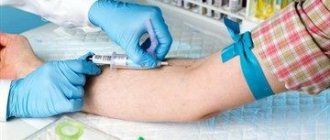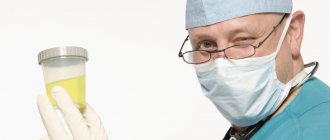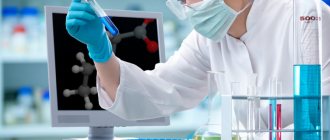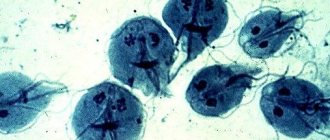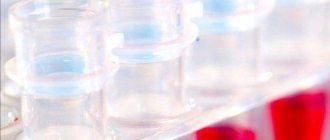General analysis (coprogram)
- 2 days before collecting biomaterial, discard tomatoes, tomato juice, pasta, beets, blueberries, pomegranates and other vegetables and fruits containing dyes.
- For 3 days, stop taking antibiotics, laxatives, and drugs that cause changes in intestinal motor function. Do not use rectal suppositories, ointments, or oils.
- Do not eat exotic fruits, vegetables and foods that are not typical for your diet as a whole. Do not overeat, exclude fatty, spicy, pickled foods.
- If you are taking medications containing iron and bismuth, they must be discontinued 2 days before stool collection.
Attention.
After radiography with a contrast agent (barium), collect feces for coprogram no earlier than 7–10 days after the examination. Women are not recommended to take the test during menstruation. Collect stool for examination in the morning, on an empty stomach. If this is difficult, you can prepare the sample in advance, but no more than 8 hours before submitting it to the laboratory. In this case, store the sample in the refrigerator (do not freeze!).
- Carry out hygiene procedures and first urinate in the toilet and flush.
- Place sterile paper (or an ironed sheet) or a disposable plastic plate in the bowl or bottom of the toilet and perform a bowel movement.
- Collect feces immediately after defecation from different places in a single portion with a special spoon mounted in the lid of a plastic container in a volume of 1–2 g (no more than 1/3 of the container’s volume). Avoid contact with urine and pieces of undigested food.
- Deliver the sample to the laboratory on the day of collection. Before delivering the sample to the laboratory, the container with stool should be kept in the refrigerator at 2–4 °C. Storage at 2-8 °C is allowed - up to 72 hours.
How does alcohol get into urine?
To understand how ethyl gets into urine, you need to understand how alcohol moves inside the body. After a person has drunk alcohol, the following algorithm of actions occurs:
- When alcohol is ingested, it is absorbed into the intestines.
- After a short period, ethyl enters the blood and is absorbed throughout the body, permeating all cells.
- Circulating through the blood, ethanol enters the kidneys, where all toxins are processed and the body is cleansed. After which the remaining alcohol is removed.
When ethyl alcohol appears in the urine, its level in the blood decreases several times. Therefore, a general urine test for alcohol can show a 100% accurate result, even if there is a small amount of alcohol inside the person. In addition, the test results are also affected by the speed of the bladder. The better the kidneys work and the faster excrement is excreted, the less ethyl there will be. The strength of the drink also plays an important role.
The effect of alcohol on blood tests
- Nutrition. For 3 days before stool collection, exclude:
- foods containing iron (apples, bell peppers, spinach, white beans, green onions, etc.);
- products containing iodine, bromine (almonds, peanuts, beans, table salt, sour cream, etc.);
— meat and meat products;
- fish and fish products;
- all green vegetables and fruits;
- all red vegetables;
- buckwheat;
- products that injure the oral mucosa (caramel, nuts, dried fruits, crackers).
- Drugs. Avoid taking medications, as well as aspirin, indomethacin, phenylbutazone, coroticosteroids, and iron-containing reserpine.
- Alcohol. Exclude 3 days before the study.
Attention. To obtain reliable results, you should not donate stool during bleeding (hemorrhoids, constipation, oral diseases, menstruation). On the day of stool collection, do not brush your teeth, so as not to injure the oral mucosa; you can rinse your mouth with a soda solution. To analyze stool in children, it is allowed to take it from a diaper, diaper, or potty.
Collection procedure
- Feces are collected in the morning, on an empty stomach, after spontaneous bowel movements.
- Carry out hygiene procedures and first urinate in the toilet and flush.
- Place sterile paper (or an ironed sheet) or a disposable plastic plate in the bowl or bottom of the toilet and perform a bowel movement. Collecting stool samples from the toilet is not allowed!
- Collect feces immediately after defecation from different places in a single portion with a special spoon mounted in the lid of a plastic container in a volume of 1–2 g (no more than 1/3 of the container’s volume). Avoid contact with urine and pieces of undigested food.
- Deliver the sample to the laboratory on the day of collection.
When diagnosing various diseases, blood tests are often performed. It is used to determine the causes of pathology, its form, degree of complexity and many other indicators. To ensure accurate results, it is worth excluding conditions that could change them, including drinking drinks that contain alcohol.
Take note! It is necessary to conduct thorough preparation before taking the tests. It is recommended to stop drinking alcohol and taking various medications 1-2 days before the diagnosis.
How does alcohol affect blood tests:
- It causes destruction of the membrane of red blood cells and reduces their mobility properties. When consumed, the quality of blood viscosity increases, the number of red blood cells decreases, and hemoglobin decreases;
- The synthesis of glucose in the liver slows down. Drinking drinks with alcohol before tests can cause an erroneous diagnosis in a healthy person, namely diabetes;
- Increases lactic acid. As a result, incorrect diagnoses may be made that may be related to the heart and blood vessels;
- Increases urea levels;
- Increases cholesterol levels;
- Increases the content of neutral fats. As a result of this, the specialist may assume that the patient has problems with blood vessels, cardiac activity, and liver;
- Causes changes in the content of micro- and macroelements. This makes it difficult to determine which substances are required;
- Leads to changes in hormonal levels.
Ethanol elimination rate
Depending on the characteristics of the body, different people remove alcohol from the blood at different rates.
Depending on the characteristics of the body, different people remove alcohol from the blood at different rates. In addition, the following factors influence the rate of ethanol elimination:
- The volume of alcohol consumed and the strength of the drink, as well as mixing different types of alcoholic drinks.
Interesting fact: a high concentration of tannins in cognac slows down the absorption of the drink from the stomach, which contributes to its long-term elimination from the body.
- A person’s weight, gender, and age. Women get drunk faster and more strongly, and it takes longer for them to remove alcohol from their bodies. The older a person is, the more difficult it is for the liver to produce enzymes to break down ethanol and the longer it takes for alcohol to leave the body.
- The presence of acute or chronic diseases in a person. The body, weakened by illness or just suffered from an illness, is more difficult to cope with processing alcohol. The rate of ethanol elimination is affected by the state of the body’s excretory system, liver and lungs. The better they work, the faster the alcohol withdrawal occurs.
- Drinking alcohol on an empty stomach speeds up its absorption and increases alcohol intoxication.
- The quality of alcoholic drinks, as well as the characteristics of snacks.
- Drinking speed. Sometimes even a lethal amount of alcohol drunk over several hours will not have such a negative effect as the same dose taken in one gulp. The thing is that when drinking alcohol gradually, part of it that previously entered the body already has time to be processed and eliminated.
Dysbacteriosis, intestinal group
To obtain the correct result, material for research is taken before the start of antibacterial therapy or in the intervals between courses of treatment, but not earlier than 2 weeks after its completion.
Attention Do not collect feces from diapers. For infants, collect material from a sterile diaper or pre-ironed onesies. If liquid feces are collected, it can be collected by placing an oilcloth under the baby.
Collection rules
- Feces should be collected in the morning, on an empty stomach.
- Carry out hygiene procedures and first urinate in the toilet and flush.
- Place sterile paper (or an ironed sheet) or a disposable plastic plate in the bowl or bottom of the toilet and perform a bowel movement.
- Collect feces immediately after defecation from different places in a single portion with a special spoon mounted in the lid of a plastic container in a volume of 1–2 g (no more than 1/3 of the container’s volume). Avoid contact with urine and pieces of undigested food.
- Deliver to the laboratory on the day of collection.
The sample can be stored for no more than 2 hours at room temperature; no more than 6 hours at 2-8 °C, more than 6 hours - frozen.
How long does the analysis take?
The time it takes to obtain the results of the analysis depends on the place where it was carried out, its purposes and the research method. On average, the wait for results ranges from several hours to several days. If a person is brought to the hospital in an ambulance in serious condition and some kind of intervention is required, such a test, along with other necessary ones, is carried out urgently.
When can you drink alcoholic beverages?
You should not drink alcohol before taking tests. Products containing alcohol can greatly change the results, but they are still not the only ones you should avoid before conducting a diagnosis. Nicotine, failure to follow a healthy diet, as well as various drugs cause distortion of indicators.
When asked whether alcohol can be consumed before blood tests, experts will answer in the negative. Under the influence of alcohol components, research data may be distorted:
- Red blood cells are destroyed;
- Cholesterol levels increase (sometimes it can reach up to 80%);
- Hemoglobin decreases.
The main danger of consuming drinks containing alcohol right before the diagnosis is that they have a strong effect on the concentration of red blood cells. It destroys them, but they are of great importance for health. They transport oxygen from the respiratory system to various organs and tissues, and transport carbon dioxide back to the respiratory organs.
When exposed to ethyl alcohol, destruction of the erythrocyte membrane is observed. This causes a disruption in their movements, they stop repelling and stick to each other. As a result, the level of red cells decreases, and this leads to the fact that hemoglobin is greatly reduced. At the same time, microthrombi form and microcirculation deteriorates.
Alcohol especially affects biochemical blood tests; it distorts the results obtained. This study is complete. Using it, you can discover which components are not enough for the body, and which, on the contrary, are present in excess quantities.
Under the influence of drinks with alcohol, changes in the biochemical blood test are observed:
- Decreased glucose levels;
- Decline in urea levels;
- Cells cannot absorb oxygen at full capacity;
- Deterioration of a person's well-being.
Drinking alcoholic beverages can lead to a sharp decrease in glucose levels. This can be especially dangerous during diabetes.
When drinking alcohol, uric acid levels in the blood decrease, and this can negatively affect health. The doctor may make the wrong diagnosis. Reduced urea levels may indicate that there are severe circulatory problems. Urea is required to remove nitrogen from the body, and if this element is elevated, this may indicate the presence of gout and chronic arthritis.
Alcohol often leads to an increase in triacylglycerols in the blood. These fats are characteristic of pathologies such as atherosclerosis, coronary heart disease, cerebral vascular thrombosis, and viral hepatitis.
Important! Many specialists try not to use alcohol-containing drugs when conducting tests. However, they are believed to be able to detect various infections. But still, ethyl alcohol can greatly change the results, so that even a professional cannot figure them out.
You should not carry out tests after drinking alcohol; it is better to wait 2-3 days. If a patient undergoes a biochemical study while hungover, he may experience the following conditions:
- Fainting;
- The occurrence of prolonged headaches;
- Signs of nausea;
- Vomit.
Usually, when performing a biochemical blood test, a small amount of blood is taken. A sober person will not notice any significant changes. However, alcohol molecules disrupt metabolic processes and negatively affect cerebral circulation.
Blood tests for sugar readings are usually prescribed for patients who have metabolic disorders. During the study, a finger prick is performed. If alcoholic beverages were consumed before the analysis, the composition of the blood becomes thick, this creates some difficulties when collecting it, and also increases the risk of blood clots.
1 gram of ethyl alcohol causes an increase in kilocalories to almost 7 units. The fact is that the molecules of alcoholic beverages instantly interfere with metabolic processes. And under the influence of liver enzymes, glucose is formed. As a result, blood sugar levels increase.
Drinks containing alcohol can temporarily lower blood glucose levels. It is kept within normal limits for 2.5 hours a day; this is provided by carbohydrates that enter the digestive organs. During the rest of the period, the liver produces glucose; it resorts to reserves in the body.
Alcohol can greatly change the data of any tests - blood, urine and even spermogram. Therefore, it is not recommended to drink it before the examination. It is especially important to stop drinking alcohol before performing a test during major operations.
If the illness is not very serious, then small amounts of alcohol are allowed. But the doctor must inform each patient about this individually.
Before 2-3 days of diagnosis, you must stop consuming drinks containing alcohol. During this period, the body experiences a attenuation of processes that can greatly affect the state of the body.
It is not recommended to take alcohol before tests; in any case, ethyl alcohol will have a negative effect on the results. And this can ultimately lead to an erroneous diagnosis. It is better not to take alcohol-containing drinks and medications a few days before the diagnosis. The only situation where alcohol does not change the indicators is an alcohol intoxication test, which is indicated for drivers and some workers.
general information
A blood test for alcohol is most often prescribed to drivers involved in an accident.
A blood alcohol test is most often prescribed for drivers involved in an accident. It is carried out in government laboratories and drug treatment clinics. Often, the result of the analysis affects the entire subsequent life of a person, because it determines not only whether he will be deprived of his rights to drive a vehicle, but also the outcome of the trial.
Blood is taken for testing in the following cases:
- Often, such an alcohol test is carried out after determining the concentration of ethanol in a person’s breath, that is, the test is performed using a breathalyzer. If the driver does not agree with the results of the test, he may request a medical examination. In this case, to find out exactly if ethanol is in the body, a blood test is performed.
- Sometimes the analysis may be needed for medical purposes. For example, such a test is needed if a person suffering from alcoholism needs to undergo surgery. In this case, before the operation you need to be sure that he did not drink alcohol.
- Also, taking a sample to detect blood alcohol may be needed to explain a person's strange behavior.
- Sometimes the concentration of alcohol in the body can be determined in minors.
- At some enterprises, blood is taken for testing from employees who must be sober at their workplace, since this is required by particularly responsible work.
Important: based on the result of the analysis, you can tell exactly how much pure ethanol is contained in the blood. Indicators are recorded in ppm and indicate the amount of ethanol in a liter of blood. Based on this figure, conclusions can be drawn about the volume of alcohol consumed.
For the analysis, only venous blood is taken, as indicated by its dark, not scarlet, color. Usually, the blood sampling site on the arm is treated with alcohol for disinfection, but when taking a blood sample for ethanol, this is not done so that the alcohol for disinfection does not get into the sample and affect the analysis results.
Protozoa and helminth eggs
To obtain the most reliable results, three stool examinations are recommended with an interval of 3–7 days.
Attention You cannot collect stool earlier than 3 days after an enema, an X-ray examination of the stomach and intestines, or a colonoscopy. The day before, do not take laxatives and drugs that affect intestinal motility (belladonna, pilocarpine), activated carbon, iron, copper, bismuth, barium sulfate, use fat-based rectal suppositories. Women should not collect stool during menstruation.
Collection rules
- Feces should be collected in the morning, on an empty stomach. If this is difficult, you can prepare the sample in advance, but no more than 8 hours before submitting it to the laboratory. In this case, the sample should be stored in the refrigerator (do not freeze!).
- Carry out hygiene procedures and first urinate in the toilet and flush.
- Place sterile paper (or an ironed sheet) or a disposable plastic plate in the bowl or bottom of the toilet and perform a bowel movement.
- Collect feces immediately after defecation from different places in a single portion with a special spoon mounted in the lid of a plastic container in a volume of 1–2 g (no more than 1/3 of the container’s volume). Avoid contact with urine, water and pieces of undigested food;
- Deliver to the laboratory on the day of collection.
Factors influencing the result
Several factors can affect the results of the analysis
Often, even in the body of a completely sober person, ethanol can be detected. The following factors can influence the results of the analysis:
- If the analysis was carried out incorrectly, that is, the laboratory assistant wiped the sample collection site with an alcohol solution.
- Sometimes in diabetes there is a large amount of acetone in the bloodstream.
- If, before undergoing the test, the person took medications containing alcohol, for example, herbal tinctures, syrups, or used an alcohol-based mouth rinse.
- Taking poisonous substances containing isopropyl or methyl alcohol.
The effect of alcohol on urine analysis
You should not drink alcohol before taking a urine test, because the drink can change the test results. If drinks with alcohol have already been consumed, then you should not carry out diagnostics the next day; it is better to wait 2-5 days so that ethyl alcohol is completely removed from the body.
Under the influence of alcohol, the following changes in analyzes may be observed:
- There is an increase in urea levels;
- Increased lactic acid;
- Increase in glucose levels;
- If alcoholic beverages contained coloring components, preservatives, or elements to enhance taste, then traces of these substances will be detected in the urine for at least 2-3 days.
Degree of intoxication
The degree of intoxication depends on the concentration of ethyl alcohol in the blood
The presence or absence of alcohol in the blood, as well as its concentration, is deciphered as follows:
- 0.00-0.49 ‰ – no ethanol was detected in the blood, that is, the person is sober. However, such a concentration can also occur after drinking one glass of beer;
- 0.50-1.49 ‰ – small amounts of ethanol were found in the blood, which indicates a mild degree of alcohol intoxication. External manifestations of this stage of intoxication may be a decrease in concentration, low self-control, a slight lack of coordination of movements, slightly unrelated speech;
- 1.50-1.99 ‰ – alcohol was found in the blood in an amount that indicates the average stage of intoxication. In this state, a person usually has difficulty controlling his emotions and may experience weakness, nausea, dizziness, or severe agitation;
- 2.00-2.99 ‰ – stage of severe intoxication. The person has completely lost coordination of movements, has slurred speech, severe dizziness, nausea, vomiting, loss of orientation in space;
- 3.00-3.99 ‰ – an extremely severe form of alcohol intoxication, which can lead to sleep, stupor, or even a coma;
- 4.00-4.99 ‰ – in such a state of alcoholic intoxication, a person quickly falls into a coma and needs urgent medical attention;
- above 5 ‰ is a lethal dose of ethanol, which can lead to coma and death due to respiratory depression.
Bacteriology
To obtain a reliable result, material for research is taken before the start of antibacterial therapy or in the intervals between courses of treatment, but not earlier than 2 weeks after its completion.
- 3-4 days before the study, it is necessary to stop taking laxatives, castor and petroleum jelly and stop administering rectal suppositories.
Attention: Feces obtained after an enema, as well as after taking barium (during an X-ray examination), are not suitable for research.
Collection rules
Is it possible to get tested after drinking alcohol?
Alcohol negatively affects the composition of urine. Therefore, even a small dose of a toxin on the eve of taking tests can significantly affect the diagnosis, for the worse. Therefore, urine analysis and alcohol are completely incompatible things.
Based on the examination results, the urologist sees a complete picture of the patient’s health status. If there are any complications, a special course of treatment is prescribed, the duration of which can be from 6 to 14 days.
Before taking tests, the doctor is obliged to warn the patient that drinking alcohol the day before the tests is strictly forbidden. After all, alcohol has a very negative effect on urine analysis.
This is due to the fact that even a small dose of alcohol can have a bad effect on the diagnosis, that is, a laboratory test will show a distorted result.
Many people believe that 1-2 glasses of beer will not make a difference. After all, they don’t even cause intoxication, which means the results will be correct. But this is not true at all. Even if you drink a small dose of beer, the results will be questionable. This means that the specialist may prescribe the wrong treatment, and the patient’s condition may worsen.
Culture for microflora and sensitivity to antibiotics
3-4 days before the study, it is necessary to stop taking laxatives, castor and vaseline oil, and stop administering rectal suppositories. Feces obtained after an enema, as well as after taking barium (during X-ray examination) are not accepted for examination!
Attention: Feces are collected before starting treatment with antibacterial and chemotherapy drugs.
Collection rules
- First urinate in the toilet and flush.
- Place sterile paper (or an ironed sheet) or a disposable plastic plate in the bowl or bottom of the toilet and perform a bowel movement.
- Collect feces immediately after defecation from different places in a single portion with a special spoon mounted in the lid of a plastic container in a volume of 1–2 g (no more than 1/3 of the container’s volume). Avoid contact with urine and pieces of undigested food.
- Deliver to the laboratory on the day of collection. If it is impossible to quickly deliver the sample to the laboratory, you can store it in the refrigerator for no more than 4 hours at 2-8 °C.
Thyroid hormone testing
Preparation for this type of analysis will be as follows:
- 2-3 days before the procedure, stop taking iodine-containing medications.
- Those patients who are prescribed medications containing thyroid hormones should definitely consult their doctor about the medications. It may be necessary to cancel their appointment for a while before submitting the material.
- The day before the study, all physical and emotional stress and consumption of alcoholic beverages are excluded. Smoking - at least one hour before the procedure.
- Blood is donated in the morning, no later than 12 noon.
- Taking a blood sample is on an empty stomach. The last meal should be no later than 10-12 hours before the study. This also includes chewing gum, lozenges and lollipops.
- Before the procedure itself, you need to sit in a relaxed state for 10-15 minutes.
- If the patient is taking medications, they should be taken after a blood sample is taken for testing.
- A person is not limited in the use of clean drinking water without gas and dyes.
For carbohydrates
- Carry out hygiene procedures and first urinate in the toilet and flush.
- Place sterile paper (or an ironed sheet) or a disposable plastic plate in the bowl or bottom of the toilet and perform a bowel movement.
- Collect feces immediately after defecation from different places in a single portion with a special spoon mounted in the lid of a plastic container in a volume of 1–2 g (no more than 1/3 of the container’s volume). Avoid contact with urine and pieces of undigested food.
- Deliver the sample to the laboratory within 4 hours.
Attention Storing a stool sample for more than 4 hours, including in the refrigerator, is not allowed.
Rules for collecting biomaterial for research
To avoid erroneous research results, a laboratory employee must adhere to the following rules for conducting analysis:
- Work with rubber gloves;
- Use only sterile blood bottles;
- Treat the site where the biomaterial is collected with a product that does not contain alcohol; usually a solution of furatsilin is used for this;
- Use only blood taken from a vein for testing.
Typically, blood is taken from a vein located on the elbow. However, if the manipulation cannot be performed for some reason, then biomaterial can be taken from any other vein.
To conduct the study, 15 ml of biomaterial is required. The analysis requires two test tubes - one container for the sample, the other for control. Both tubes are sealed, placed in special containers and transported to the laboratory.
Digestibility of drinks
For complete absorption of alcohol by the body, many internal organs are involved. This is due to the fact that he has to break down complex unknown elements to the level of simple ones.
- The alcoholic drink is absorbed by the stomach through the mucous membrane and then enters the intestines unchanged. This process is significantly accelerated if you take alcohol on an empty stomach.
- Then the alcohol enters the blood, which carries it throughout the body in a matter of minutes. The brain and liver will be hit hardest.
The easy digestibility of alcoholic beverages by internal organs is due to the fact that ethyl alcohol mixes well with water and fats. This property would help alcoholic beverages become an excellent source of energy and additional strength, but the presence of toxins in its composition makes the effect on the body extremely negative.
- Then the oxidation of alcohol in the body occurs with the help of dehydrogenase and catalase, resulting in the formation of acetaldehyde, which is highly toxic. This is the cause of such a disease as alcoholism.
- Next, the body breaks down acetaldehyde into acetic acid, which, in turn, during the breakdown turns into water and carbon dioxide.
The body has to process all the alcohol consumed, of which only 5 percent is excreted in sweat, urine, and breast milk in the case of feeding a child. That is why nursing mothers are strictly prohibited from drinking alcohol during lactation. Alcohol also negatively affects hormones, which makes its consumption very dangerous.
Eating
If you need to take urine for analysis on an empty stomach, the doctor will definitely warn you about this in advance. In other cases, there is no need to fast. However, shortly before submitting your urine for analysis, it is worth observing some restrictions regarding the foods that you can eat. The list of undesirables includes:
- confectionery, sweets (chocolate, pastries, jam, marmalade, etc.) - will significantly increase the level of sugar in the urine;
- coloring foods (beets, carrots) will affect the color of urine, which is also assessed during the study;
- products with a strong strong odor (onions, garlic, horseradish, various spices) will change the smell of urine;
- watermelon - can provoke saturation of urine with nitrates;
- marinades, pickles - after these dishes, the presence of phosphates may be observed in the urine.
It is also advisable to limit the consumption of dairy products, fried and smoked foods. It is very important that the diet is as close as possible to the usual, without excesses, but also without artificial starvation. Only in this case will the picture obtained as a result of the study most accurately reflect the true state of the patient’s health.
